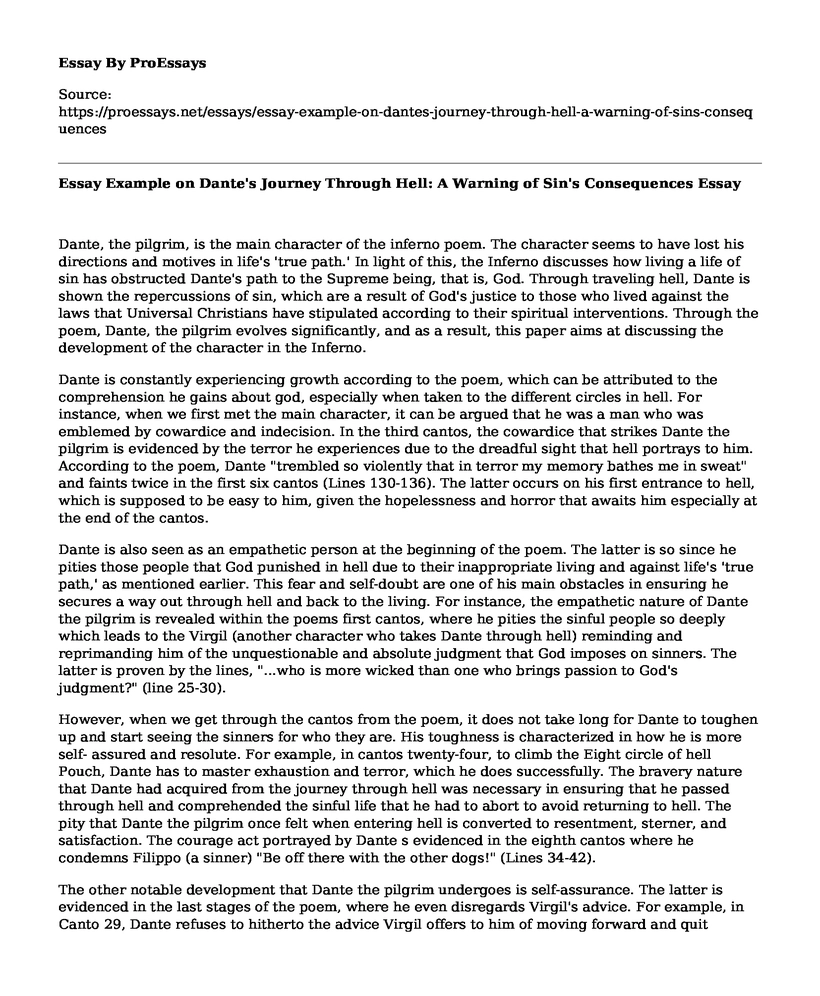Dante, the pilgrim, is the main character of the inferno poem. The character seems to have lost his directions and motives in life's 'true path.' In light of this, the Inferno discusses how living a life of sin has obstructed Dante's path to the Supreme being, that is, God. Through traveling hell, Dante is shown the repercussions of sin, which are a result of God's justice to those who lived against the laws that Universal Christians have stipulated according to their spiritual interventions. Through the poem, Dante, the pilgrim evolves significantly, and as a result, this paper aims at discussing the development of the character in the Inferno.
Dante is constantly experiencing growth according to the poem, which can be attributed to the comprehension he gains about god, especially when taken to the different circles in hell. For instance, when we first met the main character, it can be argued that he was a man who was emblemed by cowardice and indecision. In the third cantos, the cowardice that strikes Dante the pilgrim is evidenced by the terror he experiences due to the dreadful sight that hell portrays to him. According to the poem, Dante "trembled so violently that in terror my memory bathes me in sweat" and faints twice in the first six cantos (Lines 130-136). The latter occurs on his first entrance to hell, which is supposed to be easy to him, given the hopelessness and horror that awaits him especially at the end of the cantos.
Dante is also seen as an empathetic person at the beginning of the poem. The latter is so since he pities those people that God punished in hell due to their inappropriate living and against life's 'true path,' as mentioned earlier. This fear and self-doubt are one of his main obstacles in ensuring he secures a way out through hell and back to the living. For instance, the empathetic nature of Dante the pilgrim is revealed within the poems first cantos, where he pities the sinful people so deeply which leads to the Virgil (another character who takes Dante through hell) reminding and reprimanding him of the unquestionable and absolute judgment that God imposes on sinners. The latter is proven by the lines, "...who is more wicked than one who brings passion to God's judgment?" (line 25-30).
However, when we get through the cantos from the poem, it does not take long for Dante to toughen up and start seeing the sinners for who they are. His toughness is characterized in how he is more self- assured and resolute. For example, in cantos twenty-four, to climb the Eight circle of hell Pouch, Dante has to master exhaustion and terror, which he does successfully. The bravery nature that Dante had acquired from the journey through hell was necessary in ensuring that he passed through hell and comprehended the sinful life that he had to abort to avoid returning to hell. The pity that Dante the pilgrim once felt when entering hell is converted to resentment, sterner, and satisfaction. The courage act portrayed by Dante s evidenced in the eighth cantos where he condemns Filippo (a sinner) "Be off there with the other dogs!" (Lines 34-42).
The other notable development that Dante the pilgrim undergoes is self-assurance. The latter is evidenced in the last stages of the poem, where he even disregards Virgil's advice. For example, in Canto 29, Dante refuses to hitherto the advice Virgil offers to him of moving forward and quit staring at a scene of people wounded by swords repeatedly and ends up seeing a relative in the section. Another juncture that portrays Dante's self-assurance nature is that which he scolds Virgil for failing to pay closer attention (Lines 13-15).
Conclusion
It is indeed true that Dante, the pilgrim, experienced change and developed quickly through his tour of hell. In the beginning, he was empathetic and pitiful, which he was reprimanded by Virgil to quit since he was questioning God's judgment. However, as his journey progressed, he became more distasteful towards sinners and saw them for who they were and got satisfaction from watching them suffer.
Works Cited
Alighieri, Dante. "Divine Comedy - Inferno." Inferno (2008): 262.
Cite this page
Essay Example on Dante's Journey Through Hell: A Warning of Sin's Consequences. (2023, Mar 13). Retrieved from https://proessays.net/essays/essay-example-on-dantes-journey-through-hell-a-warning-of-sins-consequences
If you are the original author of this essay and no longer wish to have it published on the ProEssays website, please click below to request its removal:
- Essay on Medieval Literature - Chaucer and Boccaccio
- Jihad Concept and Five Pillars of Islam
- A Case Study of Jeremiah and the Babylonian Captivity
- Form, Sexuality, and Supernatural in Sir Gawain and the Green Night and John Donne's The Flea
- Essay Example on The Wasteland: T.S. Eliot's Take on 20th Century Chaos
- An Analysis Essay on Robert Browning's "My Last Duchess"
- Geoffrey Chaucer: Biography







